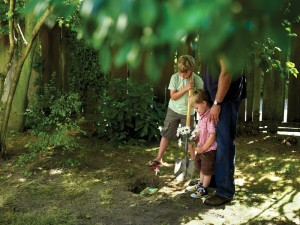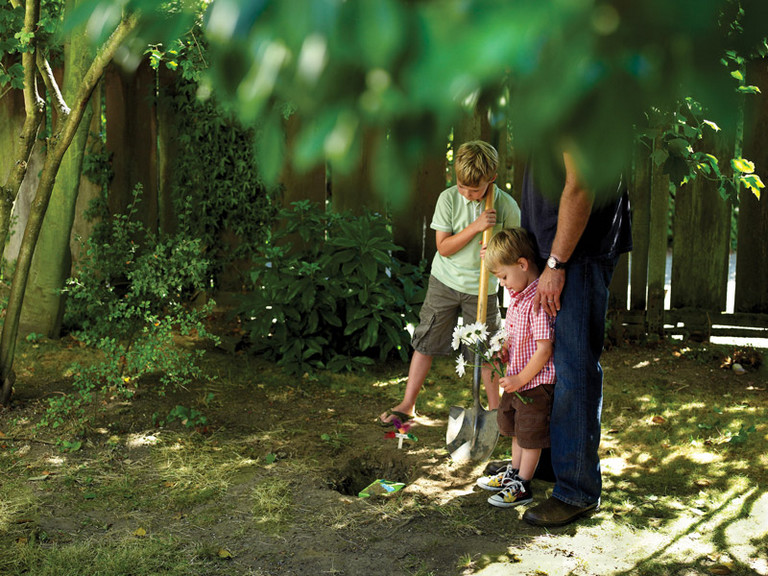Coming Full Circle
Jason Kamery //October 3, 2013//
It’s the elephant in the room. The situation no one wants to address. It’s something that pet retail customers will have to deal with, but no one wants to talk about.
With pets becoming more like children to pet owners, and not animals, the passing of a pet has become harder to deal with. Nowadays pets receive the same bereavement processes as any other family member would, and it’s something that pet retailers will have to deal with, even if they don’t want to.
And, while it makes everyone uncomfortable to talk about, it’s a traumatic part of life that can be made slightly more comforting, if the correct, compassionate steps are taken.
Over the past few years this segment of the industry has grown to respond to the ongoing needs of customers who want to lay their beloved pet to rest, like they would any other family member. They rely on pet store owners during this time, just as much as they do when they get a new puppy, or fish, or bird.
So, just as a retail owner, and their employees, need to be educated about the latest new products during the beginning stages of a pet’s life, experts say they need to be just as versed in offerings at the end of a pet’s life.
Expert Advice
Coleen Ellis, the founder of Two Hearts, a pet loss center, has been in the funeral business for 25 years and left the human side to specialize in animals about 10-12 years ago. She has worked with retailers, groomers and other pet professionals on how retailers can help their customers through those trying times.
“I had a family who I assisted with their husky,” Ellis said. “They were going to scatter the ashes, which is fine, but then I got to listening to her stories about the husky. They would talk about how the husky would get out and run down the road and always run to every neighbor and say hello. Then end up down the road and back home, so I asked them why they don’t scatter the ashes down the road and had a celebration of that life.
“As a retailer, you should be sympathizing with the family. Listen to your customer’s stories about their pet and see how you can help that family. Pet retailers could really help with a personalized item to help remember the dog. People sometimes say, ‘I miss his little nose that touched mine,’ so help them get it [something that represents the pet] on a necklace that the person can touch anytime. Paw prints that can be embroidered on a napkin or a blanket. There are so many creative and wonderful things that can be done. Do something as a retailer to acknowledge that family. If that family does get another pet, you want them to think of you in a very peaceful and caring way so they come back again to you. Don’t ever bring up getting a new pet.”
Ellis also said retailers have to teach their younger staff workers about how to handle loss.
“Most Millennials have not seen or experienced someone close to them dying,” Ellis said. “Them talking about death might not be as broad and knowing as much as someone who is older. When we have a younger staff, we have to teach them to be sensitive. Say things like, ‘I’m sorry,’ and, ‘how are you doing?’ They can’t say things like get another one, that replacement theory idea, people don’t want to hear it. If the customer is someone who came to the store a lot, send them a card, donate something for them. When we acknowledge death we acknowledge life. Let them know that you empathize with them and care for them.”
Peg Beehan, a pet bereavement specialist, said that anyone who hears of a pet’s death and acknowledges the loss and expresses empathy is offering solace. Letting people grieve goes a long way in supporting the healing process.
“In an increasingly mobile society where our pets are the ones who are there, their importance has grown to us,” Beehan said. “Coupled with a lack of formal ways to honor these champions, there was a void for remembering them that is now being filled.”
Organizations
Ellis is also a part of the Pet Loss Professionals Alliance, whose goal is to be committed to being an educational resource to its members. Their membership, including pet loss suppliers and pet death care facility operators, are dedicated to the respectful and dignified treatment of those pets entrusted to them. They do this through the creation of programs to profitably meet the changing needs of the pet death care industry and their process partners in the areas of cemeteries, crematories and pet loss facilities, as well as the creation of standards to willfully meet their customers’ expectations.
“It’s in its infant stages still,” Ellis said. “It was a ship people wanted turned around. People asking questions that’s the thing we want to continue to promote. Our consumer base needs the right tools to ask the right educated questions and we are getting there. We also have a lot of good FAQs on the site to help people with pet loss.”
The site has a strong education side that is well rounded to help retailers with information and resources for people who are grieving, not just the parents but children also.
“The main thing as far as the retailer needs to remember is looking up the rules in the communities,” Ellis said. “If a family wants to bury a pet in the backyard, you need to know if they are able to do that.”
There is also the APLB, The Association for Pet Loss and Bereavement, which offers different information about pet bereavement. It also has different in-person events and online chat rooms to answer questions and help people.
Products
Ben Riggan, the founder of Paw Pods, came up with the idea of an eco-friendly pet burial casket after two of his dogs passed away.
“I had to euthanize two Springers 5 years ago and I wanted to bury them on my property and when they gave them back to me in cadaver bags, I thought there had to be a better way than this,” Riggan said. “So I went and polled nationwide on how clinics were giving back the animals. They would give them back in a Fed Ex box, cadaver bag or garbage bag, so that’s why we came up with this product.”
All of the Paw Pods products are green and eco-friendly, they are made out of rice husk and bamboo fiber.
“They are accompanied by a sympathy card that reads our pets never really leave us and it has a seeded leaf, so if you choose, you can plant the seeded leaf with the pod and have a living memorial of where your loved one was buried,” Justin Dunaskiss, a partner at Paw Pods, said. “So we try to sell the whole experience and replace the traditional shoe box with the new dignified way for people to honor their pet’s memory.”
Dunaskiss said when working with retailers, that it sometimes is tough to get them to understand what the company is trying to do, and the experience they are trying to provide.
“If they give us the time to explain to them what we strive to do of how we are creating a lasting customer for them,” Dunaskiss said. “If you help that customer out during the most difficult time, you have that emotional connection, now for all their other pets or their next pet, they are going to come back to you because you helped them out during their most difficult time.”
John Girton, managing member of Eternal Rest Pet Casket, started the idea for his product after he and his children had to bury several small animals in the back yard over the years.
“The kids would want to bury them out in the back yard and it was in a shoebox or a baggie or something and then my idea was to make these inexpensive, nice looking caskets, for small pets, not big dogs,” Girton said. “We started researching on how many pets die every year and our research showed that there are 225 million pets, small pets, which die every year.
“We probably went through 20 different box designs and box shapes and we finally realized we need to have a box, or casket, that would hold down and sit into the foot print into the bottom of the casket, to get this product into the stores where every cubic inch so important and so expensive. We made it out of a biodegradable heavy pressed paper, it looks like cardboard but it’s not and the outside looks like a casket.”
While at SuperZoo, Girton had a successful show while his possible customer base fell into one of two groups.
“We had two very distinct reactions at SuperZoo,” Girton said. “We had people that didn’t even want to look at them. They were people who couldn’t handle the thought of something dying. The majority of the people were quite excited having something that they could sell to their customers that would be a good way for them to handle the death of a pet. We had both reactions, but by far most of the reactions were really positive.
In addition to these practical solutions, there are also products that help a person, or a friend of someone who just lost a pet, feel comfort.
For example, the Furry Angel Pet Memorial Candle is made from an all natural vegetable wax and a cotton wick. It is an all-natural, environmentally friendly candle with a dramatic crystal appearance that contains no animal or petroleum products and burns very cleanly.
Pipsqueak Productions offers pet loss sympathy cars for animal lovers who have lost a pet, something you typically don’t find in your local supermarket greeting card isle.



















